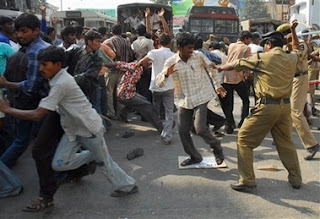Imagine a situation where governments go ahead and decide not to print cash or mint coins any more. I will come back to the point how this is possible. But, before that let me list out the advantages.
1. No more black money. Imagine what can happen if all the black money is routed into the economy again
2. Elimination of corruption to a great extent.
- No longer easy to evade taxes - For example, companies will find it difficult to supply goods or services without bills and get paid for that by their customers.
- No longer easy to grease your way through in getting favors, big or small.
- No longer easy to buy your seat through to an assembly or the parliament.
3. Choking out the organized crime:
- No more kidnappings for ransom.
- No more hired goons for murder or anything else.
- No longer easy to finance terror.
4. No longer easy to run drug, organ or human trafficking mafias.
5. No more ATMs. No more bank robberies.
The list is endless. There are so many advantages of this system that it far outweighs the few disadvantages. I will address the disadvantages and how they are not important a little later.
Let me quickly debate how this idea is possible to implement before it is brushed off as non-practicable.
Already the cheque, wire and plastic have made most of the transactions non-cash. RFID has made contactless payment possible. The advent of internet and mobiles offers tremendous scope to make cash redundant. We can embrace smart cards or go all out for mobile banking. Let me tell you, mobile banking can be made really, really simple. It can
 be even more simpler than using a TV remote. All banks accounts can have unique number more or less on the lines of telephone numbers. If somebody wants to transfer funds from his account to a sellers account all he needs to do is to punch the sellers account, then his account followed by a password and then the amount. That is all he needs to do. We can build enough safeguards into the system to prevent somebody from cheating this system. To start with, each individual can have a cash account in which he can limit the amount of transactions.
be even more simpler than using a TV remote. All banks accounts can have unique number more or less on the lines of telephone numbers. If somebody wants to transfer funds from his account to a sellers account all he needs to do is to punch the sellers account, then his account followed by a password and then the amount. That is all he needs to do. We can build enough safeguards into the system to prevent somebody from cheating this system. To start with, each individual can have a cash account in which he can limit the amount of transactions.We need not worry what will happen to illiterates in this new order. Anyway, we do not intend to keep them illterate. We want them to get educated too. Why not educate them first on the usage of mobile banking. Don't insult the ingenuity of a man, by saying this is not possible. If properly explained they can use them. When illiterates are able to use telephones I do not see a difficulty in their using this technology. The trick is to keep the technology user friendly. Mobile banking is already an in-thing in Japan.
Mobiles have really become affordable. Even if they are still out of reach of a poor man, we can donate them these. Much on the lines of TVs being donated by Governments.
Nothing is difficult to the willing. We got to really toss out the old when the time comes, and embrace the new. It may take 5 years for this to happen. That is fine. It is worth the effort to have this panacea implemented.
The only disadvantage people may express about this system is lack of privacy. What privacy are we talking about? Are we asking for a system where we can hide our misdemeanours from others? Or we talking privacy about our medical records? Each of these is different and can be addressed differently.
In the first case just be discreet. Don't get involved in something where money exchan
 ge is involved. Governments world over have acts in place for privacy of medical records. They can be fine tuned as necessary.
ge is involved. Governments world over have acts in place for privacy of medical records. They can be fine tuned as necessary.I feel privacy objections to a cashless society are misplaced. We are being monitored everywhere. Your emails can be tracked to its source. The calls you have made are no longer secret. In fact your mobiles have become the single most valuable source of information to an investigator, since the diary. Law agencies had always a right to search your house whenever required. So the ability to transact in cash will not in anyway help you protect your privacy. You lost it a long time ago.
I think we can compromise on not having freedom to do certain things without the "Big Brother" watching in the larger interest of the society. If the technology is facilitating us to help have a much cleaner and safer society, we should push for it.
We owe a safer society to our children.



